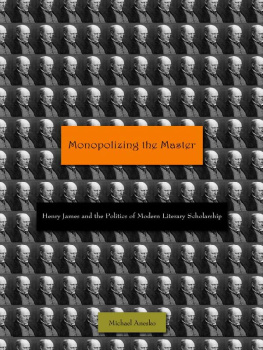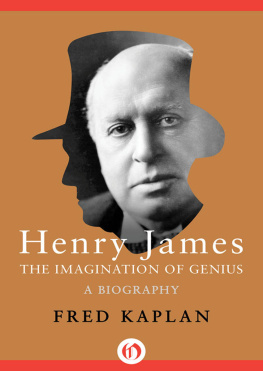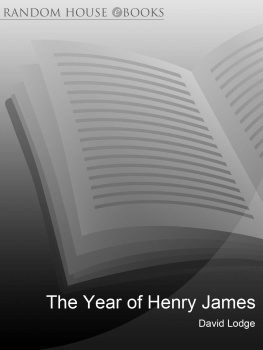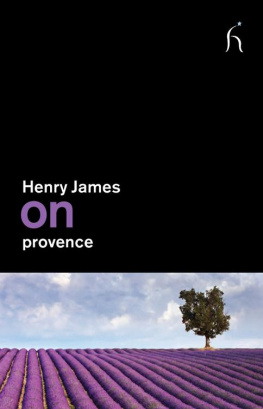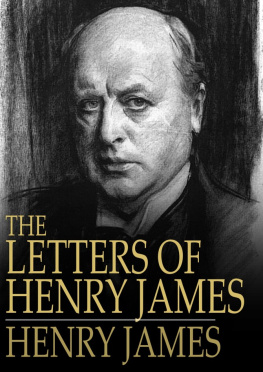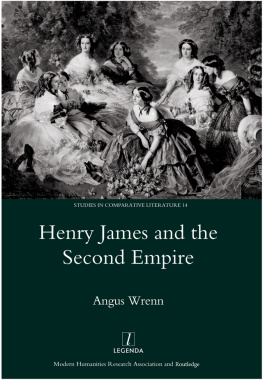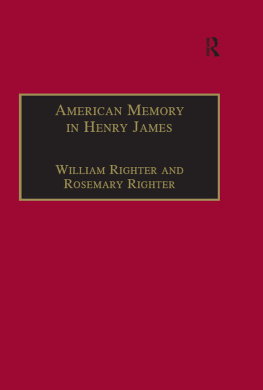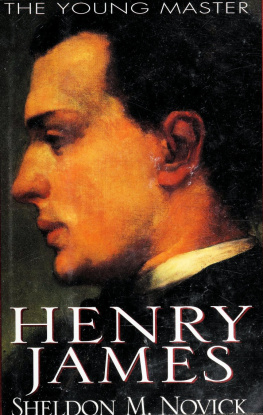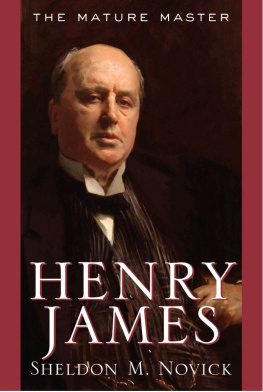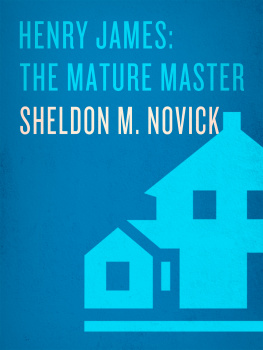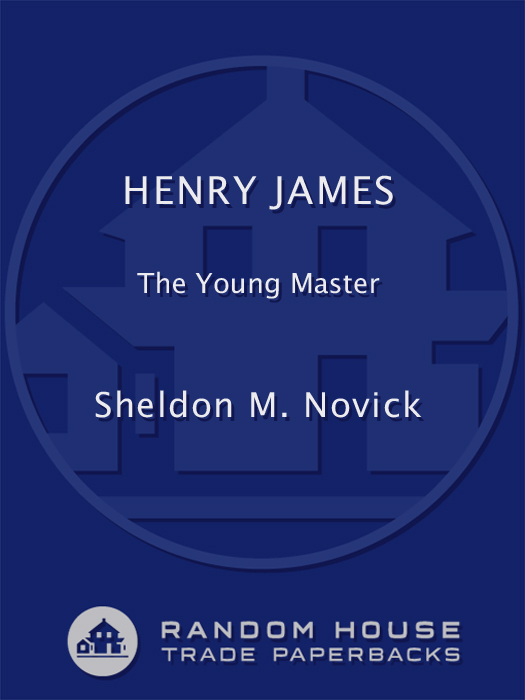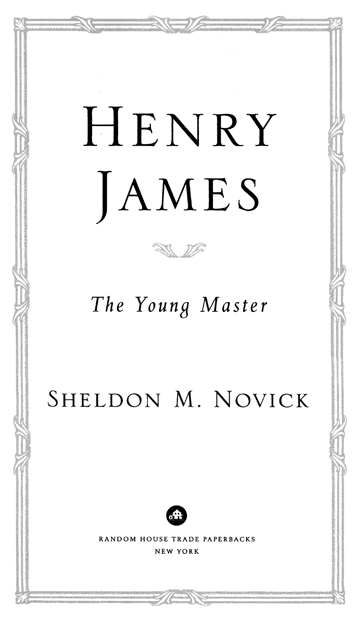Praise for
Henry James: The Young Master
Like a movie of Jamess life, as it unfolds moment to moment lends the book a powerful immediacy.
The New York Times
Splendidly written Novick has aimed to bring James back to life and he has succeeded brilliantly. The biography itself reads like a novel. It is no small ambition to write a biography of James that is in any way commensurate with that master, and Sheldon Novick has done it.
The Washington Post Book World
Beautifully written, with a grace that enables him to weave his subjects words in and out of his own.
The New Republic
Masterful in bringing James and his world to life.
San Francisco Examiner-Chronicle
A finely nuanced recounting of Jamess life from childhood to the cusp of his major works an uncluttered narrative of an emerging artist, backed with scrupulous documentation.
The New York Times Book Review
Sheldon Novicks The Young Master is much the best biography of Henry James that Ive encountered. We seem to walk and think with Henry James in these pages. Something infinitely valuable in Jamess sense of self is caught here with grace and clarity.
H AROLD B LOOM
It rescues Americas greatest novelist from the dread clutches of psychobiographers, and proves that there is no substitute for lucid, scholarly narrative. A book suffused, like Jamess own novels, with mellow nostalgia for temps perdu.
E DMUND M ORRIS
ALSO BY SHELDON M. NOVICK
Henry James: The Mature Master
Honorable Justice: The Life of Oliver Wendell Holmes
The Collected Works of Justice Holmes
(edited by Sheldon M. Novick)
2007 Random House Trade Paperback Edition
Copyright 1996 by Sheldon M. Novick
All rights reserved.
Published in the United States by Random House Trade Paperbacks,
an imprint of The Random House Publishing Group,
a division of Random House, Inc., New York.
R ANDOM H OUSE T RADE P APERBACKS and colophon
are trademarks of Random House, Inc.
Grateful acknowledgment is made to the following for permission to reprint previously published material:
Brown University Press: Excerpt from Henry James and John Hay: The Record of a Friendship, edited by George Monteiro (Providence, R.I.: Brown University Press, 1965). Copyright 1965 by Brown University. Reprinted by permission.
Harvard University Press: Excerpts from The Letters of Henry James, Vol. 1, edited by Leon Edel (Cambridge, Mass.: Harvard University Press, 1974.) Copyright 1974 by Leon Edel (editorial). Copyright 1974 by Alexander R. James (James copyright material). Reprinted by permission of the publisher.
Oxford University Press: Excerpts from The Complete Notebooks of Henry James, edited by Leon Edel and Lyall Powers. Copyright 1987. Reprinted by permission of Oxford University Press.
University Press of Virginia: Excerpt from letter which appears on pages 13-14 from The Correspondence of William James, Vol. 1, edited by Ignas Skrupskelis and Elizabeth Berkeley (Charlottesville, Va.: University Press of Virginia, 1992). Reprinted by permission.
Library of Congress Cataloging-in-Publication Data
Novick, Sheldon M.
Henry James : the young master / Sheldon M. Novick.
p. cm.
Includes bibliographical references.
eISBN: 978-0-307-79775-9
1. James, Henry, 18431916Childhood and youth. 2. Authors,
American19th centuryBiography. I. Title.
PS2123.N58 1996
813.4dc20
95-53088
www.atrandom.com
v3.1
For Carolyn
What he wanted himself was the very tick of the old stopped clocks. He wanted the hour of the day at which this and that had happened and the temperature and the weather and the sound, and yet more the stillness, from the street, and the exact look-out, with the corresponding look-in, through the window and the slant on the walls of the light of afternoons that had been. He wanted the unimaginable accidents, the little notes of truth for which the common lens of history, however the scowling muse might bury her nose, was not sufficiently fine. He wanted evidence of a sort for which there had never been documents enough, or for which documents mainly, however multiplied, would never be enough.
H ENRY J AMES
The Sense of the Past
P REFACE
N o one sees a life as a whole except the person who lives it. The story, when there is one, lives in memory alone. The biographer therefore must make a choiceto penetrate that private reality and write a book that gives some sense of the life as it was lived; or to write some other sort of book, a commentary from the outside.
To gain a true sense of a life as it was lived is not always possible. The data may have been lost, the world in which the life was lived may have vanished beyond recall. But when the critical details of ordinary life can be reconstructed, there is a sensibility, almost a separate sense, that one may use to understand the subjective existence of another person. We use this sensibility to understand almost without speech people we care for, and so writing a life is a little like falling in love. One need not like or even admire the subject of a life, but one must be able to use this particular sensibility.
In the case of Henry James, the materials for such a life are ample, thanks in large part to the work of devoted scholars. It is true that he did his best to conceal his private affairs from the public; he hated newspaper photographs. But like many private persons, James left clues to his inner life, hoping to be understood. In his last years he prepared a revised edition of his novels and stories, with prefaces explaining their genesis; he wrote memoirs of his father and brother, and a scattering of autobiographical essays and stories; all of this taken together amounts to a huge self-portrait of Henry James as an artist. He felt it was his duty to the young, to his inheritors, to record his own development, and in this great work of his old age he embedded the best of his fiction in the matrix of his own story, revising his fiction into a single tale, the story of its own telling. He could not resist including in these last works recollections even of his first sexual encounters. But to read the books of his old age in this way one needs a fund of sympathy, and must immerse oneself in the language and customs of Jamess private world. The style of his last work requires patience and attention, moroever, and many of his memories are shrouded in private references and multilingual puns. He built up portraits of people and events by a pointillist technique, so that a great deal of description must be absorbed together, without direct statements of fact.
When the necessary trouble has been taken, however, the autobiographical works provide a unique self-portrait of an acutely self-aware artist, doing his painstaking best to explain himself, the processes of his art, and the manner in which his work evolved itself from his life. In preparation for writing the book that follows, I have traced the private references, and have compressed his vast impressionist self-portrait into a thinner and more conventional sketch. Jamess published and unpublished writings were my primary materials, but I have tried also to re-create the context that gave them meaning. I have taken a standpoint a little outside and above Jamess, but as far as possible I have used Jamess own sensibility as a lamp to illumine the subject matter, in the way that he himself used the sensibility of a fictional character to light the scenes of his novels.


